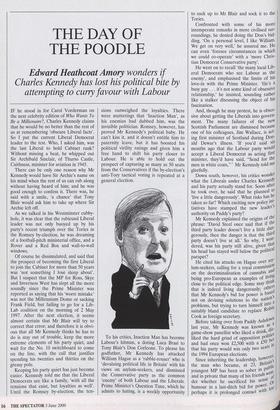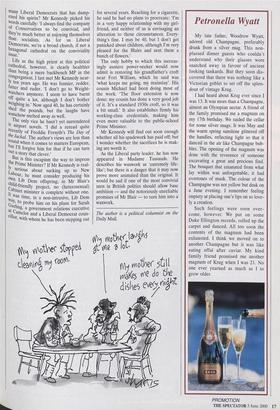THE DAY OF THE POODLE
Edward Heathcoat Amory wonders if Charles Kennedy has lost his political bite by attempting to curry favour with Labour
IF he stood in for Carol Vorderman on the next celebrity edition of Who Wants To Be a Millionaire?, Charles Kennedy claims that he would be no better than the rest of us at remembering 'obscure Liberal facts'. So I put the current Liberal Democrat leader to the test. Who, I asked him, was the last Liberal to hold Cabinet rank? Without missing a beat, he whipped out Sir Archibald Sinclair, of Thurso Castle, Caithness, minister for aviation in 1945.
There can be only one reason why Mr Kennedy would have Sir Archie's name on his mind when the rest of us can rub along without having heard of him; and he was good enough to confess it. There was, he said with a smile, 'a chance' that Tony Blair would ask him to take up where Sir Archie left off.
As we talked in his Westminster cubby- hole, it was clear that the rubicund Liberal leader was not only buoyed up by his party's recent triumph over the Tories in the Romsey by-election, he was dreaming of a football-pitch ministerial office, and a Rover and a Red Box and wall-to-wall windows.
Of course he dissimulated, and said that the prospect of becoming the first Liberal to join the Cabinet for more than 50 years was 'not something I lose sleep about'. But I suspect that the MP for Ross, Skye and Inverness West has slept all the more soundly since the Prime Minister was reported as saying that his 'worst mistake' was not the Millennium Dome or sacking Frank Field, but failing to go for a Lib- Lab coalition on the morning of 2 May 1997. After the next election, it seems almost certain that Mr Blair will try to correct that error; and therefore it is obvi- ous that all Mr Kennedy thinks he has to do is stay out of trouble, keep the more extreme elements of his party quiet, and wait for the No. 10 switchboard to come on the line, with the call that justifies spending his twenties and thirties on the greasy pole. Keeping his party quiet has just become easier. Kennedy told me that the Liberal Democrats are like a family, 'with all the tensions that exist, but loyalties as well'. Until the Romsey by-election, the ten- sions outweighed the loyalties. There were mutterings that 'Inaction Man', as his enemies had dubbed him, was the invisible politician. Romsey, however, has proved Mr Kennedy's political baby. He can't kiss it, and it doesn't entitle him to paternity leave, but it has boosted his political virility ratings and given him a free hand to shift his party closer to Labour. He is able to hold out the prospect of capturing as many as 50 seats from the Conservatives if the by-election's anti-Tory tactical voting is repeated at a general election.
To his critics, Inaction Man has become Labour's hitman, a doting Luca Brasi to Tony Blair's Don Corleone. To please his godfather, Mr Kennedy has attacked William Hague as a `rabble-rouser' who is `devaluing political life in Britain' with his views on asylum-seekers, and dismissed the Conservative party as the common `enemy' of both Labour and the Liberals. Prime Minister's Question Time, which he admits to hating, is a weekly opportunity to suck up to Mr Blair and sock it to the Tories.
Confronted with some of his more intemperate remarks in more civilised sur- roundings, he denied doing the Don's bid- ding. 'On a personal level, I like William. We get on very well,' he assured me. He can even 'foresee circumstances in which we could co-operate' with a 'more Chris- tian Democrat Conservative party'.
He went on to recall 'the many local Lib- eral Democrats who see Labour as the enemy', and emphasised the limits of his love-in with the Prime Minister. 'He's a busy guy . . . it's not some kind of obsessive relationship,' he insisted, sounding rather like a stalker discussing the object of his fascination.
And, though he may protest, he is obses- sive about getting the Liberals into govern- ment. The many failures of the new Scottish Parliament are dismissed because one of his colleagues, Jim Wallace, is act- ing first minister of Scotland during Don- ald Dewar's illness. 'If you'd said six months ago that the Labour party would accept a Liberal Democrat as acting first minister, they'd have said, "Send for the men in white coats,"' Mr Kennedy told me gleefully. Down south, however, his critics wonder what the Liberals under Charles Kennedy and his party actually stand for. Soon after he took over, he said that he planned to `live a little dangerously'. What risks has he taken so far? Which exciting new policy ini- tiatives have stamped the new leader's authority on Paddy's party? Mr Kennedy explained the origins of the phrase: 'David Steel once said that if the third party leader doesn't live a little dan- gerously, then the danger is that the third party doesn't live at all.' So why, I won- dered, was his party still alive, his head has stayed well below the political parapet? given that, He cited his attacks on. Hague over asY" lum-seekers, calling for a royal cormnission, on the decriminalisation of cannabis and being pro-European as examples of close to the political edge. Some may tiW that is indeed living dangerously; other.; that Mr Kennedy's bid for power is base,'" not on devising solutions to the nation: problems, but trying to turn himself into suitably bland candidate to replace 0)1 Cook as foreign secretary. Before taking over from Paddy Astirk°30 last year, Mr Kennedy was known asci, game-show panellist who liked a drink, ,le's liked the hard grind of opposition polite and had once won £2,500 with a £50 11;„ that his party would win only two seats "'" the 1994 European elections. y Since inheriting the leadership, 'woe the man who became, at 23, owes tits opc youngest MP has been so sober in P and in private that many of his friends vii°'''of der whether he sacrificed his sense humour in a last-ditch bid for power. t°01;) perhaps it is prolonged contact with many Liberal Democrats that has damp- ened his spirits? Mr Kennedy picked his words carefully: 'I always find the company of Conservatives to be convivial, and they're much better at enjoying themselves than socialists. As for us Liberal Democrats, we're a broad church, if not a h. exagonal cathedral on the conviviality issue.'
Life as the high priest at this political cathedral, however, is clearly healthier than being a mere backbench MP in the congregation. I last met Mr Kennedy near- ly ten years ago. He was funnier, redder, fatter and ruder. 'I don't go to Weight- watchers anymore. I seem to have burnt Off quite a lot, although I don't bother weighing in.' Now aged 40, he has certainly shed the pounds, but the laughs have somehow melted away as well. The only vice he hasn't yet surrendered is airport novels. 'I did a reread quite recently of Freddie Forsyth's The Day of the Jackal. The author's views are less than sound when it comes to matters European, but I'll forgive him for that if he can turn out a story that clever.' But is this escapism the way to impress the Prime Minister? If Mr Kennedy is real- y serious about sucking up to New Labour, he must consider producing his Own Lib Dem offspring; in Mr Blair's child-friendly project, no (heterosexual) Cabinet minister is complete without one. It Was time, in a non-intrusive, Lib Dem ,to probe him on his plans for Sarah autirlin,, a s government relations executive at Camelot and a Liberal Democrat coun- cillor, with whom he has been stepping out forseveral years. Reaching for a cigarette, he said he had no plans to procreate: 'I'm in a very happy relationship with my girl- friend, and neither of us is envisaging an alteration to those circumstances. Every- thing's fine. I may be 40, but I don't get panicked about children, although I'm very pleased for the Blairs and sent them a bunch of flowers.'
The only hobby to which this increas- ingly austere power-seeker would now admit is restoring his grandfather's croft near Fort William, which he said was `what keeps me going, my mainstay'. His cousin Michael had been doing most of the work. 'The floor extension is now done; my cousin has done a very good job of it. It's a standard 1930s croft, so it was a bit small.' It also establishes firmly his working-class credentials, making him even more valuable to the public-school Prime Minister.
Mr Kennedy will find out soon enough whether all his spadework has paid off; but I wonder whether the sacrifices he is mak- ing are worth it.
As the Liberal party leader, he has now appeared in Madame Tussauds. He describes his waxwork as 'extremely life- like'; but there is a danger that it may now prove more animated than the original. It would be sad if one of the most convivial men in British politics should allow base ambition — and the notoriously unreliable promises of Mr Blair — to turn him into a waxwork.
The author is a political columnist on the Daily Mail






































































 Previous page
Previous page